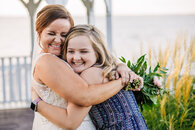weekly column
|
Each week, find a commentary on something connected to verses of Torah or another source of wisdom
|
|
Each week, find a commentary on something connected to verses of Torah or another source of wisdom
|
 Wisdom Wherever You Find it Because of you, I live. Kinley Strohl There are all sorts of friendly rivalries between the wisdom of Islam and Judaism. Arabic and Hebrew, the native languages of each tradition, have at least as much in common as French and Spanish, but there is no sacred literature that originated in the romance languages. When I discover that something I learned from the Bible or Midrash has an analogue in the Qur’an or Hadith, I am delighted. I will admit it wasn’t always that way for me. It is amazing how possessive you can feel of something that you claim is a universal truth. If I heard something I recognized from Islam (or any other tradition, for that matter), I used to think immediately, “Well, we had that first.” Like it makes a difference. Now, I accept it as validation. If something I consider to be revealed truth has been revealed more than once, it seems to me I can spend less time worrying if it is genuine. And I have become pretty liberal in my definition of that validation. For example, does the narrative of Abraham’s offering of his beloved son have enough to teach if I learn it from Isaac and you learn it from Ishmael? If parallels are good, identical reflections are even better. The Mishnah, teachings from the rabbis who lived in the early centuries of the common era, contains a discussion of the essential holiness of every human being. After expanding on the reason that all of humanity has a common ancestor in the first earthling, as the Bible says, the teaching insists that whoever preserves a single life preserves an entire world. The Qur’an affirms that exact same teaching as part of its holy and immutable revelation. Even if you are neither Jewish nor Muslim (or even if you don’t profess a faith at all), how cool is it that as a matter of undisputed principle, the dignity and centrality of every human being is affirmed without argument in distinct “philosophies.” When a teaching like that is also validated by the realm of science, I think it is more credible still – not because only science is true, but because also science is true. The differences among people of distinct geographic origin, racial heritage, ethnic identity, and any of the other ways we have found to slice and dice the human family are negligible on a molecular and genetic level. Each of us has all of us in us. Preserving a single life preserves an entire world. That’s not to say we do not have our distinctive emphases that make some of us tall or brown or inclined to like chocolate ice cream more than vanilla. Or that, more than we’d like, something that threatens that entire world emerges in a single life. A bunch of years ago, a seven-year-old girl was diagnosed with cancer that could have ended her life. Her hope was a bone marrow transplant. A nursing student in Pittsburgh heard about it and, true to her studies, took the test – a cheek swab – to see if she could donate. “All I knew was that she lived in the United States and that no one in her family was a match,” said Sarah Aiken. Sarah was that match. On the weekend of her wedding, that little girl, by then a healthy teenager, showed up to celebrate the couple and meet the woman who had saved her life. As you can imagine, it was an emotional peak to an already powerful time. The girl, Kinley Strohl, gave her donor a charm bracelet with these words: Because of you, I live. That phrase turns up in a lot of places, too. Thanks to this case – and others like it – there is a remarkable validation that is only possible because of the partnership between sacred wisdom and the endeavor of science. Whoever preserves a single life preserves an entire world. One world saved another. You might, too.
0 Comments
Leave a Reply. |
Archives
October 2023
Categories |